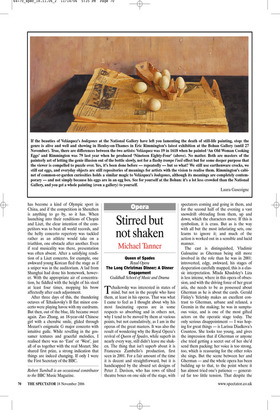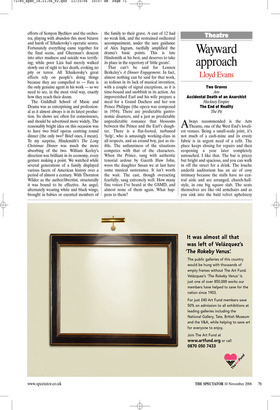Stirred but not shaken
Michael Tanner
Queen of Spades Royal Opera The Long Christmas Dinner; A Dinner Engagement Guildhall School of Music and Drama Tchaikovsky was interested in states of mind, but not in the people who have them, at least in his operas. That was what I came to feel as I thought about why his most fascinating operas are in some respects so absorbing and in others not, why I tend to be moved by them at various points, but not cumulatively, as I am in the operas of the great masters. It was also the result of wondering why the Royal Opera’s revival of Queen of Spades, while superb in nearly every way, still didn’t leave me shaken. The thing that isn’t superb about it is Francesca Zambello’s production, first seen in 2001. For a fair amount of the time it is decent and straightforward, but it is handicapped by the absurd set designs of Peter J. Davison, who has rows of tilted theatre boxes on one side of the stage, with spectators coming and going in them, and for the second half of the evening a vast snowdrift obtruding from them, up and down, which the characters move. If this is symbolism, it is crass. But as is the way with all but the most infuriating sets, one learns to ignore it; and much of the action is worked out in a sensible and lucid manner.
The cast is distinguished, Vladimir Galouzine as Gherman being still more involved in the role than he was in 2001: introverted, edgy, awkward, his stages of desperation carefully mapped, this is a classic interpretation. Mlada Khudoley’s Liza is less intense, where in this opera of obsession, and with the driving force of her great aria, she needs to be as possessed about Gherman as he is about the cards. Gerald Finley’s Yeletsky makes an excellent contrast to Gherman, urbane and relaxed, a Gremin in the making; he was in sumptuous voice, and is one of the most gifted actors on the operatic stage today. The only serious disappointment — I was hoping for great things — is Larissa Diadkova’s Countess. She looks too young, and gives the impression that if Gherman or anyone else tried getting a secret out of her she’d send them packing; her voice is too strong, too, which is reassuring for the other roles she sings. But the scene between her and Gherman — and the whole opera has been building up to that, to the point where it has almost tried one’s patience — generated far too little tension. That despite the efforts of Semyon Bychkov and the orchestra, playing with abandon this most bizarre and harsh of Tchaikovsky’s operatic scores. Fortunately everything came together for the final scene, and Gherman’s descent into utter madness and suicide was terrifying; while poor Liza had merely walked slowly out of sight to her death, evoking no pity or terror. All Tchaikovsky’s great effects rely on people’s doing things because they are compelled to — Fate is the only genuine agent in his work — so we need to see, in the most vivid way, exactly how they reach their doom.
The Guildhall School of Music and Drama was as enterprising and professional as it almost always is in its latest production. Its shows are often for connoisseurs, and should be advertised more widely. The reasonably bright idea on this occasion was to have two brief operas centring round dinner (the only two? Brief ones, I mean). To my surprise, Hindemith’s The Long Christmas Dinner was much the more absorbing of the two. William Kerley’s direction was brilliant in its economy, every gesture making a point. We watched while several generations of a family displayed various facets of American history over a period of almost a century. With Thornton Wilder as the author/librettist, structurally it was bound to be effective. An angel, alternately wearing white and black wings, brought in babies or escorted members of the family to their grave. A cast of 12 had no weak link, and the restrained orchestral accompaniment, under the sure guidance of Alex Ingram, tactfully amplified the drama’s basic points. This is late Hindemith at his best, and deserves to take its place in the repertory of ‘little greats’.
That can’t be said for Lennox Berkeley’s A Dinner Engagement. In fact, almost nothing can be said for that work, as tedious in its lack of musical invention, with a couple of signal exceptions, as it is time-bound and snobbish in its action. An impoverished Earl and his wife prepare a meal for a Grand Duchess and her son Prince Philippe (the opera was composed in 1954). There are predictable gastronomic disasters, and a just as predictable unpredictable romance that blossoms between the Prince and the Earl’s daughter. There is a flat-footed, turbaned ‘help’, who is amusingly working-class in all respects, and an errand boy, just as risible. The unfunniness of the situations competes with that of the characters. When the Prince, sung with authentic tenorial ardour by Gareth Huw John, woos the daughter Susan we at last have some musical sustenance. It isn’t worth the wait. The cast, though overacting fearfully, sang extremely well. How many fine voices I’ve heard at the GSMD, and almost none of them again. What happens to them?



































































































 Previous page
Previous page